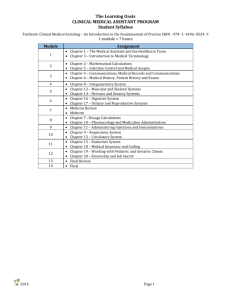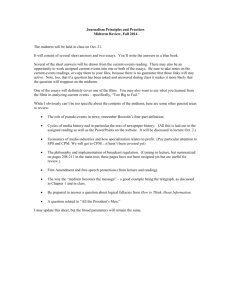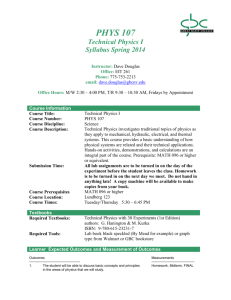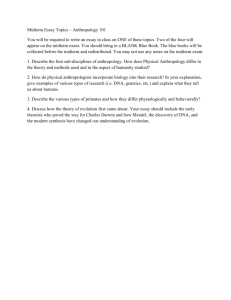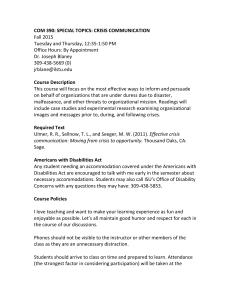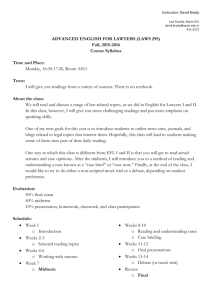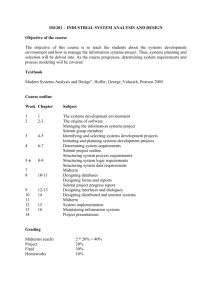Stat 414.3 Introduction to Probability Theory
advertisement
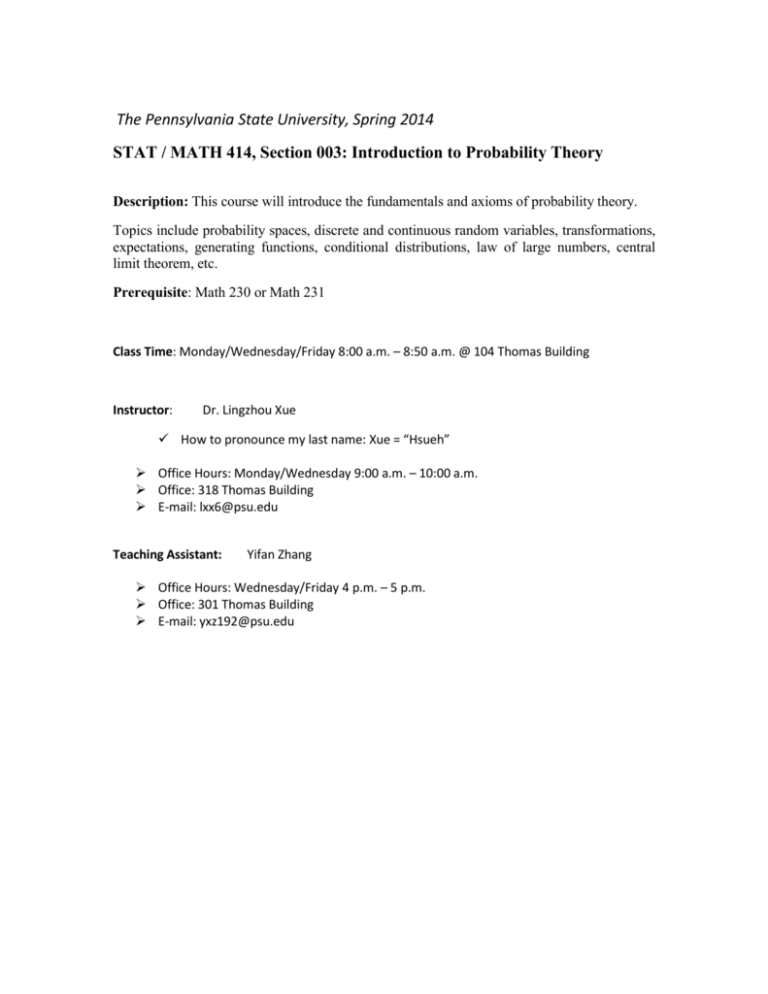
The Pennsylvania State University, Spring 2014 STAT / MATH 414, Section 003: Introduction to Probability Theory Description: This course will introduce the fundamentals and axioms of probability theory. Topics include probability spaces, discrete and continuous random variables, transformations, expectations, generating functions, conditional distributions, law of large numbers, central limit theorem, etc. Prerequisite: Math 230 or Math 231 Class Time: Monday/Wednesday/Friday 8:00 a.m. – 8:50 a.m. @ 104 Thomas Building Instructor: Dr. Lingzhou Xue How to pronounce my last name: Xue = “Hsueh” Office Hours: Monday/Wednesday 9:00 a.m. – 10:00 a.m. Office: 318 Thomas Building E‐mail: lxx6@psu.edu Teaching Assistant: Yifan Zhang Office Hours: Wednesday/Friday 4 p.m. – 5 p.m. Office: 301 Thomas Building E‐mail: yxz192@psu.edu Course Syllabus Textbook: A First Course in Probability, eighth edition, by Sheldon Ross. Targeted Coverage: most sections from Chapters 1 through 8 Course Website: Angel website at cms.psu.edu Required Work: 1. Weekly homework assignments: 30% 2. Two midterm examinations: 20% +20% Schedule: Thursdays evenings 7 p.m. – 9 p.m. February 20th and March 27th 3. A comprehensive final examination: 30% Schedule: TBA, May 5 – 9 Final Grades: Final grades will be determined as follows: A: [93, 100], A- : [90, 93), B+: [87, 90), B: [83, 87), B- : [80, 83), C+: [77, 80), C: [70, 77), D: [60, 70), F: [0, 60). Homework grading: Four problems will be selected for grading. Each homework counts for 30 points: 5 for each selected problem and 10 for completing the remaining non-graded problems. You will not receive full credit unless you show details when solving each problem. You may discuss but you need to write your homework independently. At the end of the semester, the lowest 2 homework grades will be dropped. Examinations: Midterms will be joint examinations for all three sections of MATH/STAT 414. For each midterm examination, there are three proctors. The last class before each midterm is review. Midterm will be closed-book exams. You may bring to each midterm exam a calculator and one 8.5 x 11 inch one-sided page of formulas or notes. Final examination is mandatory, closed-book, and comprehensive. All students are required to bring PSU student ID cards to the exam. If you wish, you may also bring a calculator and three 8.5 x 11 inch one-sided pages of formulas or notes. Computing: To supplement your understanding of concepts, I may assign problems for you to use statistical software R, which can be downloaded at no cost from www.r-project.org Course Rules: 1. No make-up exams will be given for ANY reason. If you miss any exam, you should provide a valid reason to the instructor; once the instructor AND the TA both approve your excuse, your missed exam score will be replaced by your score on the other midterm exam. 2. Early exams might be allowed, with prior arrangement, for students with direct conflicts due to other required university activities (chess team, athletics, field trip, Blue Band trip, etc.). The director of that program must provide a valid letter requesting that the student be excused from the exam. 3. No make-up homework assignments will be accepted for ANY reason. Your two lowest homework scores will be dropped when computing your final grade, which allows for missing homework due to unavoidable circumstances. 4. Homework will typically be due on Fridays. Homework will be collected at the beginning of class on Fridays. You can submit your homework in my mailbox by 4:00 p.m. on the same day with a 20% reduction in your score. 5. You have one week to appeal a homework or exam grade. No grade changes will be made one week after a graded homework or exam is returned. 6. Academic Integrity and Mutual Respect: All Penn State University, College of Science, and Department of Statistics policies regarding ethics, honorable behavior, and mutual respect apply to this course. These can be found at • Penn State's Policies • College of Science's Academic Integrity Policy • College of Science's Code of Mutual Respect and Cooperation 7. Students are responsible for all announcements and supplements given within any lecture and email. If you need to leave class early, please sit in the rear and leave as quietly as possible. Please be courteous to your classmates and keep extra noise to a minimum. All cell phones must be turned off before you enter the classroom. STAT / MATH 414, Section 003: Introduction to Probability Theory The Pennsylvania State University, Spring 2014 Tentative Course Schedule Date Topics Week 1 (Jan 13) Basic combinatorics (1.1-1.5) Week 2 (Jan 20) Axioms of probability, sample spaces (2.1-2.5) Week 3 (Jan 27) Conditional probability, Bayes' theorem (3.1-3.3) Week 4 (Feb 3) Independent events, more on conditional probability (3.3-3.5) Week 5 (Feb 10) Random variable (r.v.), discrete r.v.s, expectations (4.1-4.3) Week 6 (Feb 17) Expectations, variance, Bernoulli and Binomials r.v.s (4.4-4.6); moment generating functions (7.7) Midterm exam I Thursday, Feb 20, 7pm-9pm on 1.1-1.5, 2.1-2.5, 3.1-3.5, 4.1-4.5. Week 7 (Feb 24) Poisson, Geometric, Negative Binomial, Hypergeometric, others; expected values of sums (4.7-4.9) Week 8 (March 3) Continuous r.v.s, Uniform, Normal distributions (5.1-5.4) (March 10) Spring Break Week 9 (March 17) Exponential, other continous r.v.s (Gamma, Weibull); transformations (5.45.7) Week 10 (March 24) Joint distributions; independence, sums of independent r.v.s; conditional pmfs (6.1-6.4) Midterm exam II Thursday, March 27, 7pm-9pm on 4.6-4.9, 5.1-5.7, 6.1 (only for discrete r.v.s: joint pmfs, marginal pmfs) Week 11 (March 31) Conditional pdf, pmf; order statistics; multivariate transformations (6.4-6.7) Week 12 (April 7) Expectations of sums; covariances (7.1-7.4) Week 13 (April 14) Conditional expectations, law of iterated expectations (7.5) Week 14 (April 21) Limit theorems, Chebyshev's; Weak Law of Large Numbers; Central Limit Theorem (8.1-8.3) Week 15 (April 28) Strong Law of Large Numbers; Inequalities (8.4-8.5); joint cdfs (6.1); joint mgfs (7.7, pg 363) Week 16 (May 5) Comprehensive final exam TBA

